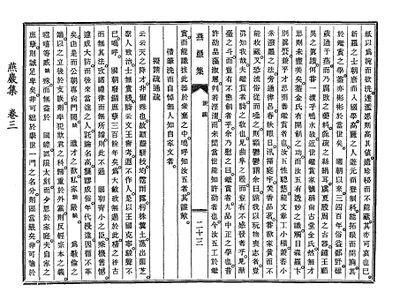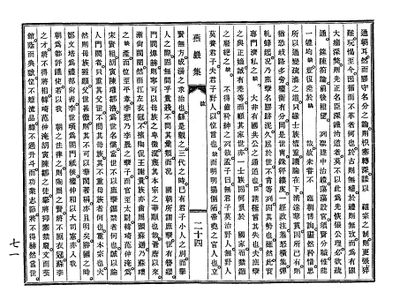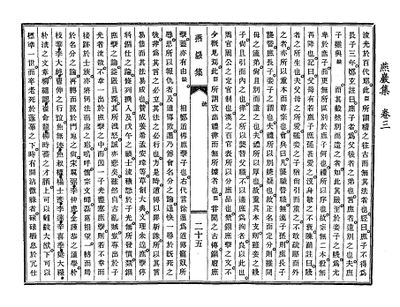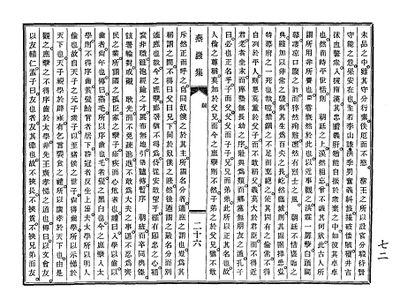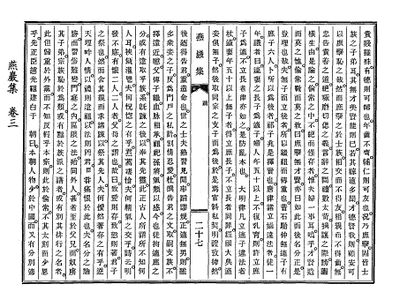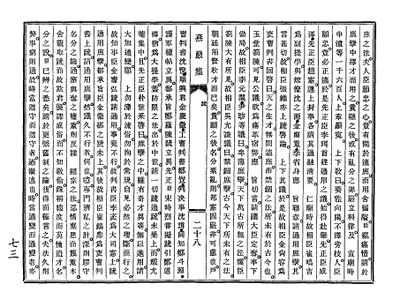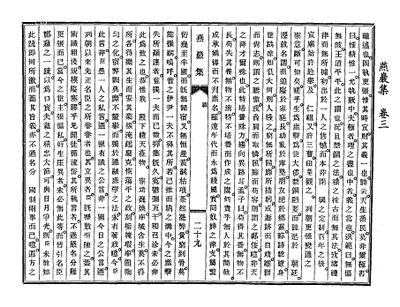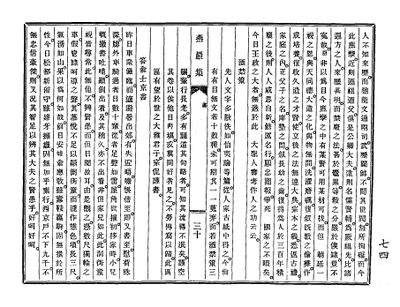"(Translation) 朴趾源 擬請疏通疏"의 두 판 사이의 차이
Jangseogak (토론 | 기여) (→Student 8 : Younès M'Ghari) |
Jangseogak (토론 | 기여) (→Student 8 : Younès M'Ghari) |
||
| 193번째 줄: | 193번째 줄: | ||
夫無子而立後者。所以繼祖而傳重也。昔石駘仲無適子有庶子六人。卜所以爲後者。祁子兆是擇賢也。唐律諸立嫡違法者。徒一年。議者曰。適妻之長子爲適子。婦人年五十以上。不復乳育。則許立庶子爲適。不立長者律亦如之。是防亂本也。 大明律凡立適子違法者杖。適妻年五十以上無子者。得立庶長子。不立長者同罪。經國大典適妾俱無子。然後取同宗之支子而爲後。於是焉官斜私契。明證攷據。然後廼得告君。重造命也。世之士夫熟習見聞。率蹈謬規。正適無男。則雖多衆妾之子。反爲門戶之私計。割情忍愛。杜撰告君之文。取嗣支族。不擇遠近。噫。父傳子繼。血脉相承。祖祀孫將。氣類以感。今也徒拘適庶之分。或有遠取乎族。系旣踈之後。以奉其先靈。此正古人所謂所不知何人耳。 | 夫無子而立後者。所以繼祖而傳重也。昔石駘仲無適子有庶子六人。卜所以爲後者。祁子兆是擇賢也。唐律諸立嫡違法者。徒一年。議者曰。適妻之長子爲適子。婦人年五十以上。不復乳育。則許立庶子爲適。不立長者律亦如之。是防亂本也。 大明律凡立適子違法者杖。適妻年五十以上無子者。得立庶長子。不立長者同罪。經國大典適妾俱無子。然後取同宗之支子而爲後。於是焉官斜私契。明證攷據。然後廼得告君。重造命也。世之士夫熟習見聞。率蹈謬規。正適無男。則雖多衆妾之子。反爲門戶之私計。割情忍愛。杜撰告君之文。取嗣支族。不擇遠近。噫。父傳子繼。血脉相承。祖祀孫將。氣類以感。今也徒拘適庶之分。或有遠取乎族。系旣踈之後。以奉其先靈。此正古人所謂所不知何人耳。 | ||
| − | Those who do not have a son adopt one, by this mean they have a succession and {{transmit [their legacy] to their grandson}}. In the past, Shi Daizhong<sup>6</sup> did not have a proper son but did have six secondary sons. The one he chose that way as descendant was the worthy Qi Zizhao<sup>7</sup> | + | Those who do not have a son adopt one, by this mean they have a succession and {{transmit [their legacy] to their grandson}}. In the past, Shi Daizhong<sup>6</sup> did not have a proper son but did have six secondary sons. The one he chose that way as descendant was the worthy Qi Zizhao<sup>7</sup>。The numerous people breaking the law of the Tang's code only lasted one year. {{People}} said: "" |
2018년 7월 10일 (화) 20:57 판
| Primary Source | ||
|---|---|---|
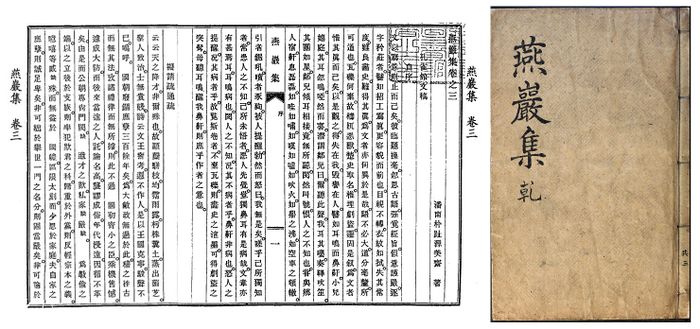 |
Title | |
| English | Status change in late Joseon Society | |
| Chinese | 擬請疏通疏 | |
| Korean(RR) | 의청소통소(Uicheongsotongso) | |
| Text Details | ||
| Genre | Literati Writings | |
| Type | ||
| Author(s) | 朴趾源 | |
| Year | 1932 | |
| Source | ||
| Key Concepts | ||
| Translation Info | ||
| Translator(s) | Participants of 2018 Summer Hanmun Workshop (Advanced Translation Group) | |
| Editor(s) | ||
| Year | 2018 | |
목차
- 1 Introduction
- 2 Original Script
- 3 Discussion Questions
- 4 Further Readings
- 5 References
- 6 Translation
- 6.1 (sample) : Jaeyoon Song
- 6.2 Student 1 : (Ren, Ruixin)
- 6.3 Student 2 : Ze, Xiaoyi
- 6.4 Student 3 : Hu Jing
- 6.5 Student 4 : Martin
- 6.6 Student 5 : Inho Choi
- 6.7 Student 6 : (Write your name)
- 6.8 Student 7 : King Kwong Wong
- 6.9 Student 8 : Younès M'Ghari
- 6.10 Student 9 : (Write your name)
- 6.11 Student 10 : (Write your name)
- 6.12 Student 11 : (Write your name)
- 6.13 Student 12 : (Write your name)
- 6.14 Student 13 : (Write your name)
- 6.15 Student 14 : (Write your name)
Introduction
Original Script
Discussion Questions
Further Readings
References
Translation
(sample) : Jaeyoon Song
- Discussion Questions:
Student 1 : (Ren, Ruixin)
云云天之降才。非爾殊也。故顚蘖騈枝。均霑雨露。朽株糞土。蒸出菌芝。聖人致治。士無貴賤。 The heaven bestow talent on everything equally. As a result, the leaves on the top of the tree and paralleled branches get same amount of rain and dew, rotten trunk and dirt could be the breeding ground of glossy ganoderma. Sages keep the country politically stable, and there is neither lowliness nor nobleness between ministers.
詩云文王壽考。遐不作人。是以王國克寧。駿聲不已。 诗经 says: king文王 lived a long life, his appointments of the elite were quiet appropriate. Therefore, the kingdom was able to reach at a peaceful status. The good reputation of the king lasts for a long time.
嗚呼。國朝廢錮庶孽三百餘年矣。爲大敝政無過於此。稽之往古而無其法。攷諸禮律而無所據。則此不過國初宵小之臣。乘機售憾。遽成大防。而後來當途之人。託論名高。襲謬成俗。年代浸遠。因循不革矣。 Alas, our country has banned 庶孽 for over 300 years. No maladministration can be worse than this. If we look back to the ancient times, there are precedents of this action. If we check with the law and discipline rite, there aren't any bases of this action too. This is just some hypocrites乘機售憾 and finally became a major discrimination. After that, people who are in power託論名高,and this misconduct was inherited as a custom, never ever abolished. 由是而公朝專尙門閥。缺 遺才之歎。私家 缺 嚴 缺。爲斁倫之端。以之立後於支族。則率犯欺君之科。歸重於外黨。則反輕宗本之義。噫嘻等威 缺 殊。而無益於 國軆。區限太刻。而少恩於家庭。夫自家之庶孽。則誠足卑矣。非可絀於擧世一門之名分。則固當嚴矣。非可論於通朝耳。然而膠守名分之論。則枳塞轉深。諉以 祖宗之制。則更張猝難。玩愒至今。因循而不革者何也。於古則無稽。於禮則無攷。而爲有國大痼深弊。則先正名臣深識治道者。莫不以此爲先恢張公理。必欲疏通。 筵陳箚論。前後相望。 列聖建中治軆。蕩蕩設官。須賢分職。惟能一軆均 缺。豈復差於 缺 哉。故未甞不 臨朝博詢。䀌然矜惜。思所以通變疏滌之道。只緣士族權重。議論在下。淸途華貫。固所已有。則猶恐歧路多旁。權衡有分。同是世胄。
- Discussion Questions:
Student 2 : Ze, Xiaoyi
同是世胄。銖秤縷度。一經政注。羞怒橫集。彈軋蜂起。况乃庶孽名膠跡泥。久屈於世。 不肯等列。固其勢也。雖然。此實專門濟私之。大非有國共公之通道也。 臣請極言其失也。Because of this, descendants from same clans were evaluated closely, once their political positions had been decided, there would be shames and anger arising (among them) due to the fact that illegitimate offsprings’(secondary sons') fame and achievements had been tarnished, leading to their submissions in the society. Even though this means of positioning officials particularly satisfies individual interests, it does not serve public common senses. I appeal to present all its mistakes.
夫庶孽之與正嫡。誠有差等。而顧其家世。亦一士族。固何負於 國家。而禁錮之廢絶之 缺。不得齒衿紳之列哉。孟子曰。無君子莫治野人。無野人莫養君子。夫君子野人。以位言也。而明明揚側陋。帝堯之官人也。立賢無方。成湯之求治也。繇是觀之。三代之時。已有君子小人之別。而擧人之際。固無間乎貴賤。不問其彙類。Generally speaking, there indeed are differences between people who was born by a concubine and who was born by a legal wife. However, considering the fact that they belong to the same family, how can they disappoint their country, and thus be banned and abolished, not even ranked as a petty official. Mencius says, no great men, barbarians can not be controlled; no barbarians, great men can not be nurtured. Great men and barbarians were usually distinguished by their ranks. It was the custom that officials of Emperor Yao followed to promote the poor, while spreading great virtues. There were no accurate/clear means to select officials, which was Cheng Tang (King of Shang)’s ruling strategies. Since the Xia-Shang-Zhou period, there were distinguishes between great men and small people; however, there were no hierarchies among civil examination graduates. No one cared about individual’s affiliations.
而况國朝所謂庶孽。世有簪纓。門閥燀赫。則寧可以母族之卑微。混蔑其本宗之華顯也哉。晉唐以來。漸尙閥閱。然而江左衣冠。不擯陶侃王謝。貴族亦齒周顗蘇𨘀。乃蘇瓌之 缺 產。而位至平章。李愬乃李晟之孽子。而官至太尉。韓琦范仲淹。爲宋賢相。胡寅陳瓘鄒浩。爲世名儒。當世不以庶孽錮禁者何也。誠以論人門閥者。只重其父世。不問其母族。其不重母族者何也。重本宗也。Moreover, secondary sons of yangban in our state usually connected to next generations (due to…) how can we merely define a person’s identity based on the inferiority of his mother’s family clan, and thus neglect the prosperousness of his original clan. Since the Jin and Tang dynasties, even though meritorious families gradually became more influential, the officials of 江左 did not oppose 陶侃, the noble clans of 王謝 regarded 周顗 as their colleagues. 蘇𨘀 was the secondary son of 蘇瓌, but he achieved the position of director (?). 李愬 was the illegitimate child of李晟, but he obtained the position of grand commandant. Both韓琦 and 范仲淹 were wise chief ministers of the Song dynasty, 胡寅, 陳瓘 and 鄒浩 were famous Confucian scholars. Why secondary sons were not abandoned during that time? In fact, when people talked about clans, they only emphasized (paid attention to) fathers’ clans and did not ask mothers’ clans. The reason they did not care much about mothers’ clans were that they emphasized their original clans.
- Discussion Questions:
Student 3 : Hu Jing
夫然則母族雖顯。父世甚微。則其不可以華閥著稱。亦且明矣。勝國之時。鄭文培爲禮部尙書。李世璜爲閤門祇侯。權仲和以大司憲。亦入我朝爲都評議使。若以我朝之法律之。則陶周之賢。將不廁衣冠。蘇李之才。將不得將相。韓琦范仲淹胡寅陳鄒之徒。擧將抑塞禁廢。文而芸舘。蔭而典獄。位不離流品。祿不過升斗。而功業志節。將不得赫然當世。流光於百代耶。此臣所謂稽之往古而無其法者也。經曰。庶子不得爲長子三年。鄭玄註曰。庶子者。爲父後者之弟也。言庶者。遠別之也。夫庶子雖與缺。而其截然別而遠之者。如此其嚴。至於妾子之賤。爲尤卑於庶子。而更無所區別於庶子何也。禮所以序也。故宗無二本。殺無再降也。記曰。父母有若庶子庶孫甚愛之。沒身敬之不衰。陳澔註曰。賤者之所生也。夫父母之所愛。雖妾之子猶尙引而重之。不敢疏略而外之者。亦所以重本而尊宗也。會典曰。凡襲職替職。無適子孫。則庶長子襲替。庶長子。妾子之謂也。夫禮所以別嫌疑也。故正名而定分。則雖同母之適弟。尙且別而遠之也。
Even though one's mother is from a prestige family, as his father has a very low status, we cannot say he is from a prominent clan. This is also crystal clear. In the previous dynasty (Goryeo), Jung Moonbae (鄭文培)1 was appointed the Minister of Rituals; Lee Sehwang(李世璜)2 was Audience Usher; and Kwon Junghwa(權仲和)3 was designated as Great Keeper of the Fundamental Laws, who also held the post of commenter when being dispatched to our state.
1 Jung Moonbae
2 Lee Sehwang
3 Kwon Junghwa(權仲和)
- Discussion Questions:
Student 4 : Martin
夫禮所以厚也。故重其本支。則雖妾之賤子。尙且引而內之也。律之所以襲替父職。不以適庶爲拘者。良以此也。周官周公之定官制也。漢之百官表所以分庶品也。禁錮庶孽之文。不少槪見焉。此臣所謂攷諸禮律而無所據者也。臣甞聞之古傳。錮廢庶孽。葢亦有由 缺。相鄭道傳庶孽子也。右代言徐選爲道傳寵奴所辱。思所以報仇者。及道傳敗。選乃傅會名分之論。逞快一辱於旣死之後。非爲其言之必立。其法之必行也。方是時。道傳以罪新誅。所以其言易售而其法易成也。贊成姜希孟安瑋等。草創大典。文理未遑。
If the rituals are not??, therefore the branches of the family are important. Although a son of a concubine, still be guided and embraced. As for inheriting the father’s positions the law does not restrict main or secondary sons, this is because it is good. “The Offices of Zhou” established the official system of the Duke of Zhou, the table of occupants of high state offices in the Book of Han distinguishes the different positions, yet texts prohibiting or obstructing secondary sons can, not a few can be found? This minister says that examining the various rites and laws there is nothing to base this on. The minister heard that in old, the obstruction and ignorance of secondary sons has its origin. Chancellor Jeong Dojeon was the descendant of a secondary son...
- Discussion Questions:
Student 5 : Inho Choi
4. 夫禮所以厚也。故重其本支。則雖妾之賤子。尙且引而內之也。律之所以襲替父職。不以適庶爲拘者。良以此也。周官周公之定官制也。漢之百官表所以分庶品也。禁錮庶孽之文。不少槪見焉。此臣所謂攷諸禮律而無所據者也。臣甞聞之古傳。錮廢庶孽。葢亦有由 缺。相鄭道傳庶孽子也。右代言徐選爲道傳寵奴所辱。思所以報仇者。及道傳敗。選乃傅會名分之論。逞快一辱於旣死之後。非爲其言之必立。其法之必行也。方是時。道傳以罪新誅。所以其言易售而其法易成也。贊成姜希孟安瑋等。草創大典。文理未遑。
5.(My own numbering..) 庶孽停科錮仕之論。條列撰入。及戊午之禍。士流積怨於子光。無所發憤。禁錮庶孽之論。益嚴且深。其所洩怒。誠亦悲矣。雖然。自古亂賊。豈專出於子光者流哉。不幸一出於庶孽之中。而因一子光盡塞庶孽。則若不幸而接跡於士族。亦將何法而處之耶。嗚呼。儒宗文師。磊落相望。一轉而局於名分之論。再轉而屈於門地之尙。宋翼弼,李仲虎,金謹恭之道學。朴枝華,李大純,曺伸之行誼。魚無迹,魚叔權,楊士彥,李達,辛喜季,梁大樸,朴淲之文章。柳祖認,崔命龍,柳時蕃之才諝。
As to depriving the bastards of the qualification for civil examination blocking their path to the employment, the list of clauses are inserted in the writing(what writing?). When it comes to the tragedy of the year of Muo, the literati(how do we translate 士?) accumulated resentment toward Ryu Jagwang and had no recourse for relieving its anger. It became more severe and deeper. that with which they relieved their anger was also truly sad(probably referring to the policy toward the bastards). However, how could the traitors only be from the likes of Ryu Jagwang since ancient times? Unfortunately, one such traitor appeared from those who are sons of concubines, and due to this one Jagwang, the path of the bastards are completely blocked. If the would be traitor unfortunately steps into the likes of the families of literati(Does 士族 implies kinship relations?), by what law in the future would one deal with this? Ah! the holder of Confucian heritage and the literary master succeed each other with abundance. Upon pivoting once, one bends on one's separate doctrine. Upon pivoting twice, one is carried away by that which one's pedigree lineage esteems. The Way Leaning of Songikpil(Songikp'il), Ijungho, and Gimgeungong(Kimgŭn'gong), Enacting Righteousness of Bak Jihwa(Pak Chihwa), I Daesun and JoSin(Cho Shin), the Letter of Eo Mujeok(Ŏ mujŏk), Eo Sukgwon(ŏ sukkwŏn), Yang Saeon(yang saŏn), I Dal, Sin Huigye(shin hŭigye), Yang Daebak, and Bakpyo(pak p'yo), and the Brilliance of Ryu join Choe Myeongnyong(ch'oe myŏngnyong), and Ryu Sibeon(ryu shibŏn). ....
- Discussion Questions:
Student 6 : (Write your name)
- Discussion Questions:
Student 7 : King Kwong Wong
- Translations:
今之庶孽。郞署猶不得爲。侍從安敢望乎。雖有願忠之心。補袞非職。雖抱經綸之才。展布無地。引儀臚傳。暫序 朝班。而卒同輿儓。該署輪對。或襯 耿光。而不免疎逖。進不敢爲大夫之事。退不忍爲齊民之業。所謂國之孤臣。家之孽子。疹疾而心危者也。禮曰。入學以齒。以齒者。尙年也。傳曰。燕毛。所以序齒也。毛者。髮之黑白也。今之庶孽入太學。則不得序齒。黃髮鮐背者居下。勝冠者反坐上座。夫太學所以明人倫也。故自天子之元子衆子。以至諸侯之世子。尙得齒學。所以示悌於天下也。天子視學於辟雍。有乞言饗食之禮。所以廣孝於天下也。由是觀之。庶孽之不得序齒於太學。非先王廣孝悌之道也。傳曰。以文會友。以友輔仁。孟子曰。友也者。友其德也。故不挾長。不挾貴。不挾兄弟而友。貴賤雖殊。有德則可師也。年齒不齊。輔仁則可友也。况乃庶孽。固皆士族之子弟耳。
Nowadays secondary sons are not allow to become even a 郞署, how can they dare to expect becoming a 侍從? Although they have a desire of being loyal, they do have the duty to admonish the ruler. Although they hold the talent of statesmanship, they have no grounds to exercise and display it.
- Discussion Questions:
Student 8 : Younès M'Ghari
- Translations:
其無才美賢能則已。若其諒直多聞。才德賢我。則顧安可以庶孽恥之哉。然而庶孽之於士族。相交而不得友。相親而不得齒。無忠告責善之道。絶琢磨切偲之義。言辭之間。禮數太苛。揖讓之際。謗讟橫生。由是論之。倫常之中。不絶而僅存者。惟夫婦一事耳。嗚乎。才賢遺而莫之恤。倫常斁而莫之救。曰庶孽無才賢。亦曰如此而後名分正。是豈理也哉。
[If] they do not have either talent, grace, wisdom, capability, it is fine. [Yet] if they expect true and plurial knowledge, then they have to develop talent and virtue on their own. Therefore 틀:Couldn 틀:Gu'an be ashamed from being as a secondary son? That being the case, if secondary sons enter the literati class, they will exchange but do not gain friendship, they will be initimate but not gain 틀:Seniority. They do not have the way of heartfelt advices and mutual learning of the virtuous. They have no way out to the righteousness of polishing their style and get more talentuous. As for the moments of expressing [oneself], the different grades of courtesy are extremely severe. As for the circumstances of courteous behaving3, slanders happen unexpectedly. For this reason we discuss about it. In the proper relationships, what does not die and remains is only a one thing4 of the husband and the wife. Alas! The anxiety of having talent, wisdom and 틀:Transmitting5 but not being anyone, the deliverance of the proper relationship and the immoral. It is said that secondary sons do not have talent and wisdom. It is also said, that since they are so, their status is correct. How can this be logic?
夫無子而立後者。所以繼祖而傳重也。昔石駘仲無適子有庶子六人。卜所以爲後者。祁子兆是擇賢也。唐律諸立嫡違法者。徒一年。議者曰。適妻之長子爲適子。婦人年五十以上。不復乳育。則許立庶子爲適。不立長者律亦如之。是防亂本也。 大明律凡立適子違法者杖。適妻年五十以上無子者。得立庶長子。不立長者同罪。經國大典適妾俱無子。然後取同宗之支子而爲後。於是焉官斜私契。明證攷據。然後廼得告君。重造命也。世之士夫熟習見聞。率蹈謬規。正適無男。則雖多衆妾之子。反爲門戶之私計。割情忍愛。杜撰告君之文。取嗣支族。不擇遠近。噫。父傳子繼。血脉相承。祖祀孫將。氣類以感。今也徒拘適庶之分。或有遠取乎族。系旣踈之後。以奉其先靈。此正古人所謂所不知何人耳。
Those who do not have a son adopt one, by this mean they have a succession and {{transmit [their legacy] to their grandson}}. In the past, Shi Daizhong6 did not have a proper son but did have six secondary sons. The one he chose that way as descendant was the worthy Qi Zizhao7。The numerous people breaking the law of the Tang's code only lasted one year. 틀:People said: ""
1 庶孽: sons of concubines; they are considered illegitimate during the Yi dynasty.
2 顧安 틀:(pinyin: Gù'ān; 1289-1365): a famed Chinese painter of the Yuan Dynasty.
3 揖讓: when a host or a guest invites the other to enter or sit somewhere first.
4 一事: "the one thing" can be understood as "their progeniture".
5 遺: that is, having successors as a father.
6 石駘仲 (pinyin: Shí Dàizhòng): one of the kings of the Wei (卫, pinyin: Wèi) during China's Spring and Autumn Period (770-476/403 BCE).
7 祁子兆 (pinyin: Qí Zǐzhào).
- Discussion Questions:
Student 9 : (Write your name)
- Discussion Questions:
Student 10 : (Write your name)
- Discussion Questions:
Student 11 : (Write your name)
- Discussion Questions:
Student 12 : (Write your name)
- Discussion Questions:
Student 13 : (Write your name)
- Discussion Questions:
Student 14 : (Write your name)
- Discussion Questions:
